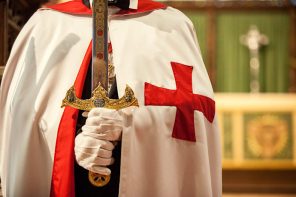The 2016 Democratic National Convention in Philadelphia came to an end last night with Hillary Clinton’s speech, in which she accepted the presidential nomination. Clinton, of course, was the star of the evening, but one of the most memorable speeches came from Khizr Khan, the father of U. S. Army captain Humayun S. M. Khan who was killed in Iraq in 2004.
Khan opened his remarks by introducing himself and his wife as “patriotic American Muslims” with “undivided loyalty” to the United States. “If it were up to Donald Trump” said Khan, his son “would never have even been able to be in America.”
“Donald Trump…smears the character of Muslims…disrespects other minorities…He vows to build walls and ban us from this country.”
Khan then posed a question for Trump. “Have you ever been to Arlington Cemetery? Look at the graves of brave patriots who have died defending the United States. You will see all faiths, genders, and ethnicities. You, have sacrificed nothing.” The convention crowd erupted in applause and rose to their feet.
It was one of the most powerful rebukes of Trump during the Democratic convention, and it was delivered by a Muslim. On one level, the inclusion of Khan in a prime convention speaking slot is a sign that party officials are increasingly comfortable with including Muslims in a visible way. Khan was introduced by Kareem Abdul-Jabbar and Monday night’s headliner, Bernie Sanders, was introduced by Minnesota’s Rep. Keith Ellison, the first Muslim elected to U.S. Congress.
Yet there were moments in the convention that seemed to affirm old stereotypes about Muslims as “foreign” and a potential threat, as when Bill Clinton addressed Muslims directly in his Tuesday night speech: “If you’re a Muslim and you love America and freedom and you hate terror, stay here and help us win and make a future together.”
Some Muslim leaders criticized Clinton for trafficking in assumptions that Muslims were not already part of the United States, while Peter Beinart described his assumption that Muslims should be required to prove their loyalty as a “lapse into Trumpism.”
The presence of Abdul-Jabbar and Ellison served as a reminder that Muslims in the U.S. are not exclusively immigrants. Abdul-Jabbar and Ellison, both African Americans, converted to Islam when they were young. Furthermore, speaker after speaker ranging from Jesse Jackson to Andrew Cuomo condemned the anti-Islamic rhetoric of Trump as fundamentally un-American.
The United States has a history of intolerance toward religious minorities, including Catholics, but history has also shown that members of disenfranchised groups often do attain high levels of political power.
John F. Kennedy became the first Catholic to be elected president in 1960. Barack Obama became the first African American president and, now, we may be on the verge of electing the nation’s first woman as president.
For the past eight years, Obama has been accused of “absolutely” being a Muslim. Hopefully we are moving closer to a day when we assume the best about our Muslim neighbors and the qualifiers of “patriotic” and “loyal” are simply assumed. The irony of it all? That Trump and his unabashed Islamophobia may just have blazed the trail for a major step forward in mainstream acceptance of Muslims in the US.




